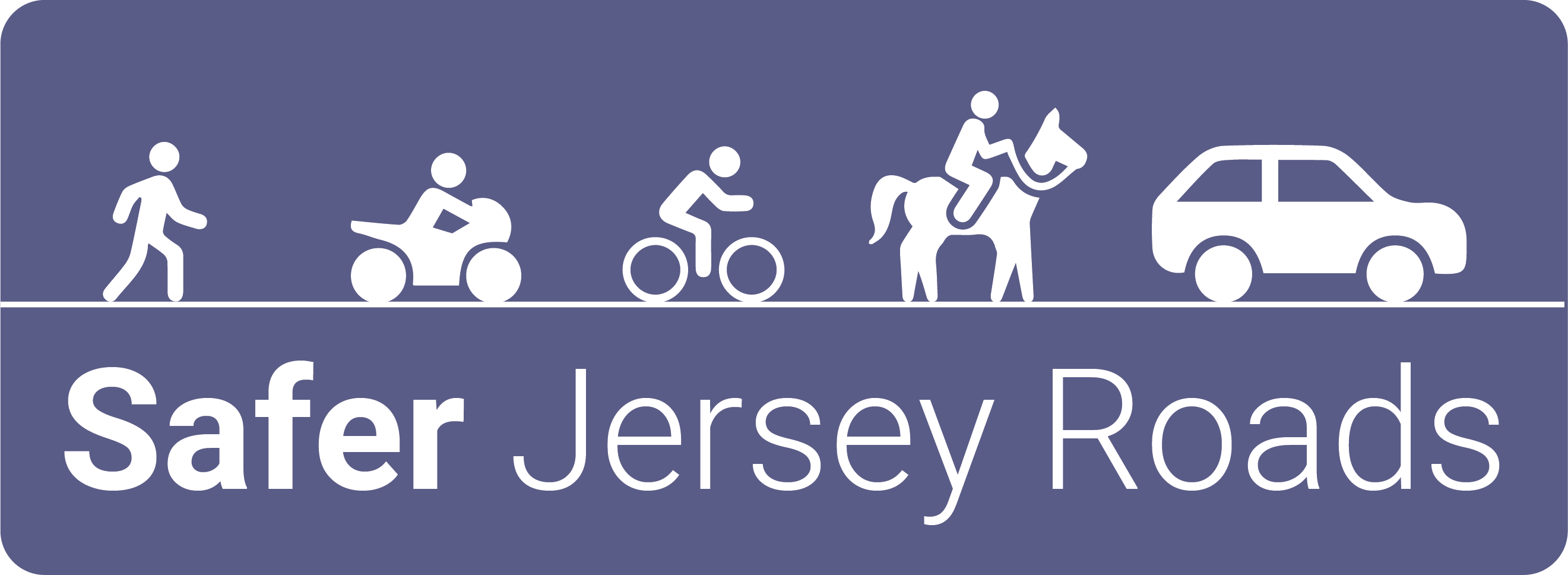Post-Collision Response
Effective post-collision response is a crucial part of creating a safer road network. In Jersey, every second counts in minimising injury severity and saving lives. A coordinated effort from emergency responders, health services, and the broader community is essential to improving outcomes and supporting recovery for those affected by road collisions.
On this page, you will find a step-by-step guide on what to do if you are involved in a collision, detailed information about the roles of emergency and health services post-collision, and insights into how these coordinated efforts contribute to a more effective and compassionate response.

Emergency Services
In the aftermath of a road collision, Jersey’s emergency services play a vital role in ensuring swift and effective response to protect lives, prevent further harm, and maintain public safety. Each service—the States of Jersey Ambulance Service, Jersey Fire & Rescue Service, and States of Jersey Police—brings unique expertise and resources, working together to deliver a coordinated and life-saving approach to post-collision incidents.
States of Jersey Ambulance Service: Post-Collision Responsibilities

- Immediate Medical Care: Providing life-saving treatment on-site, stabilising patients, and managing injuries to prevent further harm
- Transportation to Hospital: Safely transporting patients to the hospital for advanced care, prioritising those in critical condition
- Triage and Coordination: Assessing injury severity at the scene to prioritise care and communicate effectively with hospital teams for seamless handover
- Assistance for Non-Injured Victims: Providing basic health checks for individuals involved in a collision who are uninjured but may be in shock or require monitoring
- Medical Oversight for First Responders: Offering guidance to police or fire personnel delivering first aid until additional ambulance crews arrive
States of Jersey Ambulance Service: Post-Collision Responsibilities

- Immediate Medical Care: Providing life-saving treatment on-site, stabilising patients, and managing injuries to prevent further harm
- Transportation to Hospital: Safely transporting patients to the hospital for advanced care, prioritising those in critical condition
- Triage and Coordination: Assessing injury severity at the scene to prioritise care and communicate effectively with hospital teams for seamless handover
- Assistance for Non-Injured Victims: Providing basic health checks for individuals involved in a collision who are uninjured but may be in shock or require monitoring
- Medical Oversight for First Responders: Offering guidance to police or fire personnel delivering first aid until additional ambulance crews arrive
States of Jersey Police: Post-Collision Responsibilities

- Road Closure and Diversion Management: Setting up detours and communicating with the public about alternate routes to minimise traffic disruption
- Investigations: Collecting evidence, documenting the scene, and determining the cause of the collision to support legal or insurance processes
- Collision Data Collection: Gathering on-scene collision data, which is used to analyse collision trends
- Victim and Family Liaison: Acting as a point of contact for families of victims to provide updates, support, and information about legal processes
- Communication with Media: Providing timely and accurate updates to the public and media about the collision, road closures, and ongoing investigations
- Collaboration with Other Services: Working closely with the fire and ambulance teams to ensure a coordinated and efficient response
States of Jersey Police:
Post-Collision Responsibilities

- Road Closure and Diversion Management: Setting up detours and communicating with the public about alternate routes to minimise traffic disruption
- Investigations: Collecting evidence, documenting the scene, and determining the cause of the collision to support legal or insurance processes
- Collision Data Collection: Gathering on-scene collision data, which is used to analyse collision trends
- Victim and Family Liaison: Acting as a point of contact for families of victims to provide updates, support, and information about legal processes
- Communication with Media: Providing timely and accurate updates to the public and media about the collision, road closures, and ongoing investigations
- Collaboration with Other Services: Working closely with the fire and ambulance teams to ensure a coordinated and efficient response
States of Jersey Fire and Rescue Service: Post-Collision Responsibilities

- Vehicle Extrication: Using specialised tools to safely extract individuals trapped in vehicles, often under challenging conditions
- Stabilising Vehicles: Ensuring that vehicles involved in the collision are stable, particularly if they’re overturned or in precarious positions
- Fire Suppression: Managing vehicle fires or spills that may pose further risks to victims, responders, or the public
- Managing Hazardous Materials: Addressing spills of fuel, chemicals, or other hazardous substances to prevent environmental damage or secondary incidents
- Lighting and Scene Visibility: Deploying portable lighting equipment to illuminate collision scenes for safer operations during night-time or poor visibility conditions
- Collaboration with Other Services: Working closely with the police and ambulance teams to ensure a coordinated and efficient response
States of Jersey Fire and Rescue Service: Post-Collision Responsibilities

- Vehicle Extrication: Using specialised tools to safely extract individuals trapped in vehicles, often under challenging conditions
- Stabilising Vehicles: Ensuring that vehicles involved in the collision are stable, particularly if they’re overturned or in precarious positions
- Fire Suppression: Managing vehicle fires or spills that may pose further risks to victims, responders, or the public
- Managing Hazardous Materials: Addressing spills of fuel, chemicals, or other hazardous substances to prevent environmental damage or secondary incidents
- Lighting and Scene Visibility: Deploying portable lighting equipment to illuminate collision scenes for safer operations during night-time or poor visibility conditions
- Collaboration with Other Services: Working closely with the police and ambulance teams to ensure a coordinated and efficient response
Health Services
Once the emergency services have stabilised and transported individuals from the scene of a collision, the health services play a critical role in providing long-term care and support. Their involvement ensures that patients not only recover from their immediate injuries but also receive the necessary physical, emotional, and psychological rehabilitation to rebuild their lives.
Jersey Health and Community Service: Post-Collision Responsibilities

- Emergency Hospital Care: Provide immediate triage, life-saving treatments, and specialist interventions, including surgery and critical care for severe injuries
- Specialist Treatments: Deliver advanced care through trauma surgeons, neurologists, or orthopedic specialists, tailored to the specific injuries sustained
- Physical and Psychological Rehabilitation: Assist patients in regaining mobility and independence through physiotherapy, occupational therapy, and mental health support for trauma and emotional recovery
- Chronic Pain and Long-Term Recovery: Manage lingering pain and complications with specialised care, follow-up appointments, and access to assistive technologies like prosthetics
- Discharge and Community Support: Create individualised discharge plans, ensuring a seamless transition from hospital to home with support from community health services.
Health and Care Jersey:
Post-Collision Responsibilities

- Emergency Hospital Care: Provide immediate triage, life-saving treatments, and specialist interventions, including surgery and critical care for severe injuries
- Specialist Treatments: Deliver advanced care through trauma surgeons, neurologists, or orthopedic specialists, tailored to the specific injuries sustained
- Physical and Psychological Rehabilitation: Assist patients in regaining mobility and independence through physiotherapy, occupational therapy, and mental health support for trauma and emotional recovery
- Chronic Pain and Long-Term Recovery: Manage lingering pain and complications with specialised care, follow-up appointments, and access to assistive technologies like prosthetics
- Discharge and Community Support: Create individualised discharge plans, ensuring a seamless transition from hospital to home with support from community health services.
